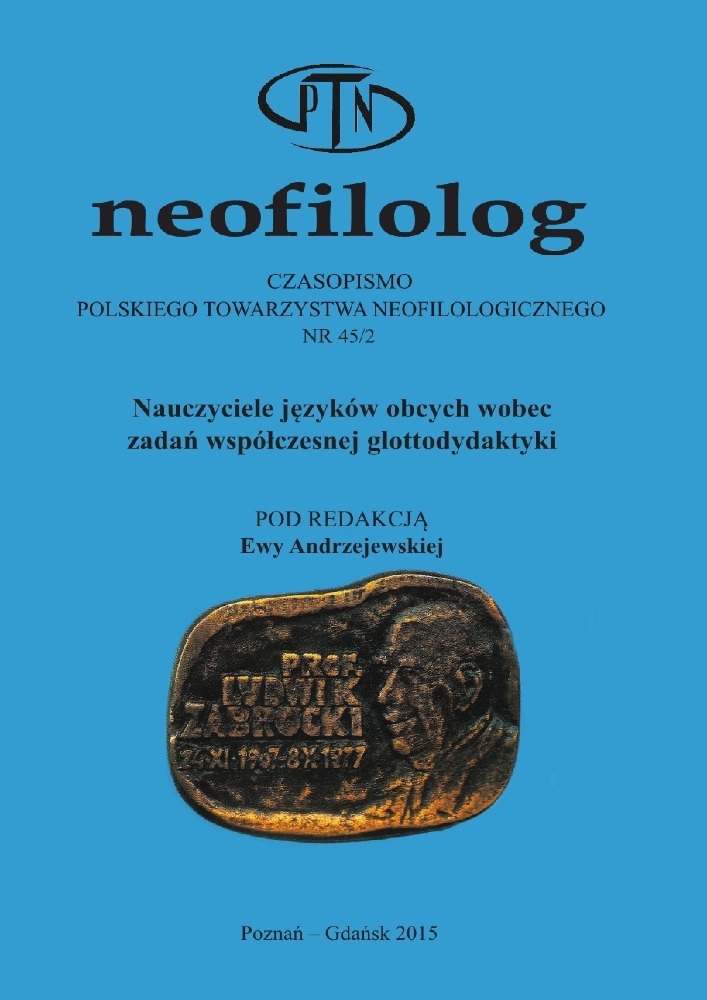Résumé
The article presents an overview of the situation in language teachingand teacher education in Poland. An attempt has been made to evaluate
the developments of the last 25 years in the Polish educational landscape
in the field of language teaching, protection and promotion of
minority and regional languages, pre- and in-service teacher education.
Special attention has been given to expectations vis-à-vis the teaching
profession in Poland and abroad, challenges arising in teacher training
institutions, difficulties teachers encounter in their everyday functioning
as well as their training needs. Controversial issues arising from inconclusive
research results have also been identified. In the final part
of the text ideas are provided for quantitative and qualitative research
and its role in pre- and in-service teacher education.
Références
Alatis, J. E. (red.). 1991. Georgetown University Round Table on Languages and Lin-guistics (GURT). Linguistics and Language Pedagogy. Washington: Georgetown University Press.
Bateson, G. 1972. Steps to an Ecology of Mind. New York: Ballantine.
Byram, M. 2012. „Reflecting on teaching 'culture' in foreign language education” (w) Insights into the European Portfolio for Student Teachers of Languages (EPOSTL) (red. D. Newby). Newcastle: Cambridge Scholars Publishing: 83-100.
Council of Europe. 2012. Recommendation CM/Rec (2012)13 of the Committee of Ministers on Ensuring Quality Education. Strasbourg: Council of Europe.
Dervin, F. 2013. „Making sense of education for diversities. Criticality, reflexivity and language” (w) Multicultural Education. From Theory to Practice (red. H. Arslan i G. Rata). Newcastle: Cambridge Scholars Publishing: 85-102.
Dumont, H., Istance, D., Benavides, F. (red.). 2013. Istota uczenia się. Wykorzystanie wyników badań w praktyce. Warszawa: Wolters Kluwer.
Enever, J. (red.). 2011. ELLiE. Early Language Learning in Europe. London: British Coun-cil.
European Charter for Regional and Minority Rights. 1992. Strasbourg: Council of Eu-rope.
European Commission, 2000. European Report on the Quality of School Education. Brussels: European Commission.
Europejskie badanie kompetencji językowych ESCL. Raport krajowy. 2011. Warszawa: IBE.
GUS. 2014. Education in 2013/14 School Year. Warsaw: Central Statistical Office.
Huber, J. (red.). 2011. Teacher Education for Change. Strasbourg: Council of Europe.
Jiang, K. 2011. The Dangers of Gamification. Why We Shouldn’t Build a Game Layer on Top of the World. June 13, 2011 http://krystlejiang.files.wordpress.com/2011/ 07/the-dangers-of-gamification.pdf DW 10.03.2015.
Kelly, M., Grenfell, M. 2004. European Profile for Language Teacher Education. A Frame of Reference. Southampton: University of Southampton.
Komorowska, H. 2011. „Paradigms in teacher education” (w) Promoting Multilingual-ism. Teaching – Learning – Assessment (red. H. Komorowska). Warszawa: FRSE: 13-38.
Komorowska, H. 2012. „Learner autonomy and its implications for the EPOSTL” (w) Insights into the European Portfolio for Student Teachers of Languages (red. D. Newby). Newcastle: Cambridge Scholars Publishing: 51-82.
Komorowska, H. 2013. „Multilingualism. Its open and hidden agenda”. Studies in Sec-ond Language Learning and Teaching 3 (4): 463-482. http://www.ssllt.amu.edu.pl DW 14.04.2015.
Komorowska, H. 2014. „Analyzing linguistic landscapes. A diachronic study of multilin-gualism in Poland” (w) Teaching and learning in multilingual contexts: Sociolin-guistic and educational perspectives (red. A. Otwinowska i G. De Angelis). Clevedon: Multilingual Matters: 19-31.
Machul-Telus B., Majewska, M. 2011. Edukacja mniejszości narodowych i etnicznych oraz społeczności posługującej się językiem regionalnym w Polsce 2010-2011. Warszawa: ORE.
MAiC, 2014. II Raport dla Sekretarza Generalnego Rady Europy z realizacji przez Rzeczpospolitą Polską postanowień Europejskiej Karty Języków Regionalnych lub Mniejszościowych. Warszawa: Ministerstwo Administracji i Cyfryzacji.
Maslach, Ch., M. Leiter. 2011. Prawda o wypaleniu zawodowym. Warszawa: Wolters-Kluwer.
Newby, D., Allan, R., Fenner, A. B., Komorowska, H., Jones, B., Soghikyan, K. 2007. Eu-ropean Portfolio for Student Teachers of Languages. Graz: Council of Europe.
OECD. 2008. Trends Shaping Education. Paris: OECD.
Paradowski, M. B. 2011. „Multilingualism – assessing benefits” (w) Issues in Promoting Multilingualism. Teaching – Learning – Assessment (red. H. Komorowska). War-saw: FRSE: 331-350.
Piechurska-Kuciel, E. 2011. „Foreign language teacher burnout: A research proposal” (w) Extending the Boundaries of Research on Second Language Learning and Teaching (red. M. Pawlak). Berlin: Springer: 211-223.
Pitura, J. 2012. „Adult educator development and burnout: self-management of gener-ic competences in problem Prevention” (w) The Futures of Adult Educator(s): Agency, Identity and Ethos. Joint Conference Proceedings (red. A. Heikkinen, L. Jogi, W. Jutte i G. Zarifis). Tallin: University of Tallin Publishing: 28-35. http://webzoom. freewebs.com/esrea-renadet/2012%20%20TALLINN%20CONFERENCE%20PROCEEDINGS.pdf DW 20.02.2015.
Surveylang – First European Survey on Language Competences. Final Report. 2012. Brussels: Council of Europe.
Tribble, C. 2012. Change in English Language Teaching: Lessons from Experience. London: British Council.
Ustawa o mniejszościach regionalnych i etnicznych i o języku regionalnym. 6 stycznia 2005. Dziennik Ustaw nr 17 Poz. 141.
Weiner, B. 2012. Emocje moralne, sprawiedliwość i motywacje społeczne. Gdańsk: Smak słowa.
Licence
© Hanna Komorowska 2019

Ce travail est disponible sous licence Creative Commons Attribution - Pas de Modification 4.0 International.
Auteurs :
Les auteurs de textes acceptés pour publication dans la revue Neofilolog sont tenus de remplir, signer et renvoyer à l'adresse de la rédaction, un accord sur l'octroi d'une licence gratuite pour les œuvres, avec obligation d'accorder une sous-licence CC.
En vertu de cet accord, les auteurs des textes publiés dans la revue Neofilolog accordent à l'Université Adam Mickiewicz de Poznań une licence non exclusive et gratuite et permettent l'utilisation de la sous-licence Creative Commons Attribution-NoDerivatives 4.0 International (CC BY-ND 4.0).
Les auteurs se réservent le droit de disposer librement de l'œuvre.
Utilisateurs :
Les utilisateurs d'Internet intéressés ont le droit d'utiliser les œuvres publiées à partir de l'année 2017 sous réserve des conditions suivantes :
- reconnaissance de la qualité d'auteur - l'obligation de fournir des informations sur la qualité d'auteur, le titre, la source (liens vers l'œuvre originale, DOI) et la licence, ainsi que l'œuvre distribuée ;
- sans créer d'œuvres dérivées - l'œuvre doit être conservée dans sa forme originale, p. ex. les traductions ou les interprétations ne peuvent être distribuées sans le consentement de l'auteur.
Tous les textes publiés sont soumis au droit d'auteur.
Autres :
L'Université Adam Mickiewicz de Poznań se réserve le droit à la revue dans son ensemble (mise en page, forme graphique, titre, conception de la couverture, logo, etc.).
.
